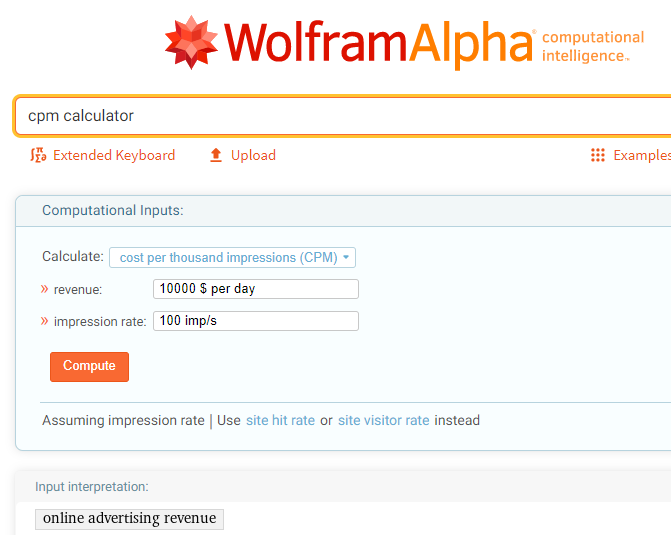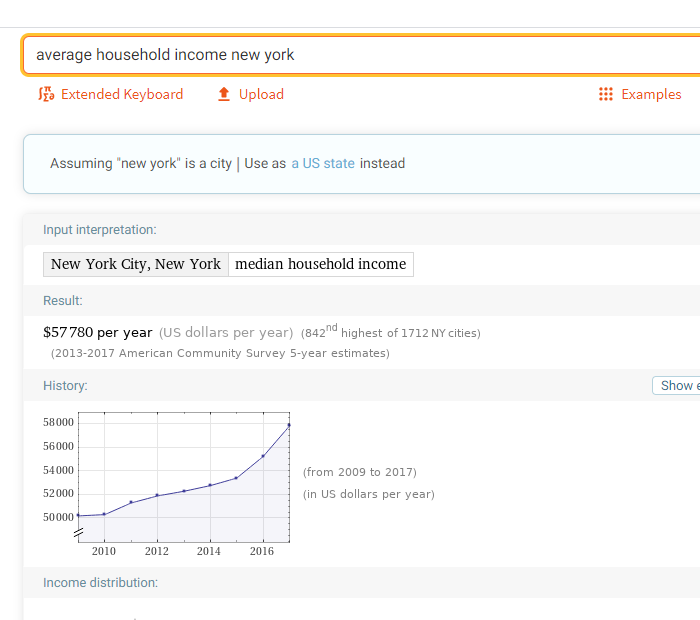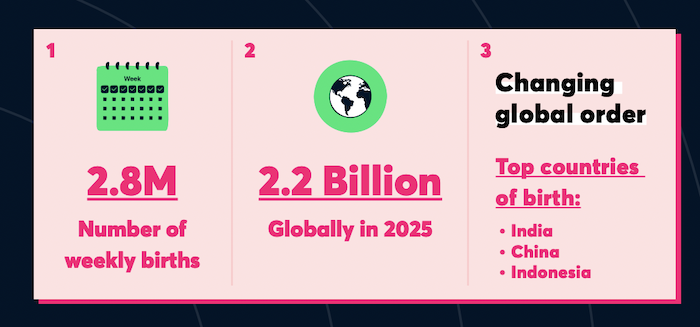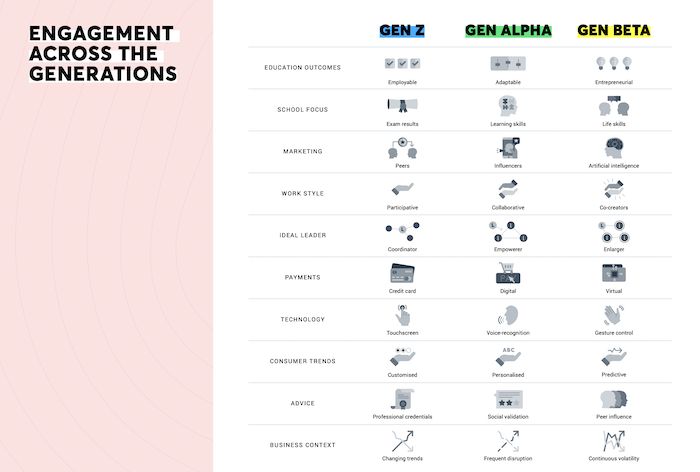
How to Use Wolfram Alpha for Marketing Research
Are you searching for new ways to make sense of the marketing data you’ve been aggregating?
With the continuous growth in artificial intelligence (AI) and the ever-collecting stores of data, there’s a better way to view and use existing marketing data.
While many online tools promise functionality to allow users to see data in a whole new way, search engine Wolfram Alpha actually delivers.
Through a combination of AI, algorithms, and an extensive knowledge base, this unique engine can provide marketers with valuable data points, as well as answers to complex computational queries.
Interested?
You should be.
In this post, we’ll explore Wolfram Alpha offerings and break down five ways the search engine can best benefit data-minded marketers.
What Is Wolfram Alpha?
Wolfram Alpha self identifies as an answers engine.
While the term engine may conjure images of Google’s search results, Wolfram Alpha wasn’t created to compete with Google—in fact, it has highly different functionality than the search giant.
Launched in 2009, the engine serves up lists and tables, providing users with specific, numeric-based answers to their questions. Given this emphasis on numbers and data, this engine isn’t necessarily for purchase-minded searchers; rather, it’s a data-driven engine that can provide insights.
Wolfram Alpha works through harnessing the extensive stores of collected expert-level data and algorithms to answer questions, conduct analyses, and build reports.
Versatile in its usability, this search engine can be used by students to solve equations just as easily as it can help you find nutritional information about M&Ms.
While you may not care about the caloric values associated with M&Ms, you should care about how these incredible data stores can benefit marketers.
While the free version of this engine is filled with useful actions, Wolfram Alpha Pro users can also upload data, get custom visuals for presentation, and access unique web apps.
Below, we break down the five top ways marketers can benefit from the unique tool that is Wolfram Alpha.
5 Ways to Use Wolfram Alpha for Marketing Research
While some marketers may love a deep data dive, some may detest it. Regardless of which camp you belong in, Wolfram Alpha can take the guesswork out of data analysis for you.
What’s more, the engine removes the guesswork from data points, providing more reliable figures than other sources.
Below are the five best ways Wolfram Alpha can help you optimize your marketing campaigns.
1. Upload Files for Automatic Analysis and Computation
Whether you’re tracking the success of your content, the performance of your social channels, or break-even analysis, aggregating all of your marketing data can be difficult.
With the Wolfram Alpha engine, the heavy lifting is done for you, letting you focus on other aspects of your marketing plan.
Check out this simple tool for calculating cost per thousand impressions (CPM):

A breeze, right?
In addition to the engine’s standard calculators, you can select from hundreds of existing widgets from the Widget Gallery that come with a simple embed code that you can easily copy and paste.
These widgets operate as shortcuts for your most-used formulas or can be built into your site.

Regardless of the computations you seek, Wolfram Alpha can complete simple to complex equations, making your job that much easier.
2. Research Keywords
As you most likely know, keyword research refers to the process of finding and analyzing terms individuals enter into search engines. This process lets marketers discover which terms to target to reach their ideal audience.
After you’ve identified the most important topics that relate to your audience and identified the related keywords, it’s time to dive deeper.
While you can certainly turn to Google’s “searches related to…” list that manifests at the bottom of your query page, you can also look to Wolfram Alpha to help you get creative about related terms that your audience may be searching.
Wolfram Alpha offers information about words that can be of particular interest to marketers. The two that top our list include word frequency and the thesaurus function:
- Word frequency: This tool enables searchers to learn the historical usage of a word, tracking its ebbs and flows in popularity over time. This can benefit your keyword research, as it speaks toward a word’s popularity (or lack thereof) and can be a strong indicator of search volume.
- Thesaurus: This feature not only allows users to search term synonyms but to either narrow or expand that search through hypernyms or hyponyms. Beneficial to marketers in its broadening and narrowing capacity, Wolfram Alpha helps you discover related terms you may have otherwise bypassed.
3. Visualize Data
While data for data’s sake is one thing, taking data and turning it into something consumable for your company or client takes data utility to the next level.
Wolfram Alpha doesn’t just compute metrics; it can chart them too.
Do you have some marketing results you want to see charted over time, with the ebbs and flows of success reflected in an easily consumable manner?
Plotting functions with Wolfram Alpha is super easy: Simply enter the particular function you want to graph and let the engine do the rest for you. The number and type of graphs that Wolfram Alpha can build are seemingly endless.
If you find yourself overwhelmed, here are three standard graph types Wolfram Alpha can help you build that are incredibly effective or digital marketers:
- Stacked charts: These can help demonstrate cumulative composition throughout a time span, such as leads from marketing channels.
- Pie charts: They are incredibly versatile and can help demonstrate everything from budget allotment to the percentage of users using respective social media channels.
- Distribution graphs: These allow marketers to show a single variable with a multitude of distribution points.
4. Use Localization
Perhaps you’re interested in doing some out-of-home advertising for your latest campaign. You want to be sure that the population in the area you’ve identified as a potential site aligns with your audience.
You could turn to Google, but you should turn to Wolfram Alpha.
While Google can serve up different results to queries depending on where you’re physically standing, it can’t make every site it aggregates data from do the same. Wolfram Alpha, however, does not rely on other sites for its wealth of data, which makes the engine’s localization analysis more accurate to your query.
Let’s return to the out-of-home advertising example: Imagine you want to know the per capita income per a specific area to know if your product will work within the parameters of the population’s budget.
While Google will give you pretty decent results, Wolfram Alpha will provide you with more precise ones with accompanying information (like currency) reflecting your current location.

5. Compare Data
With the advertising revenue function of Wolfram Alpha, you can determine the projected outcomes of your advertising campaigns, as well as all the associated metrics.
Okay, maybe not that impressive. However, you can also compare campaigns to one another, identifying areas for improvement and relative and collective successes and failures.
The search engine’s comparison function doesn’t end here.
While on traditional search engines like Google and Bing, you’d be hard-pressed to find a sales tax comparison for three United States cities, but Wolfram Alpha serves up this data quickly and easily.
In addition, if you’re in need of a comparison between two data sets, Google has to have a relevant site indexed to provide that information, or you have to manually compare the sets. With Wolfram Alpha, you can compare multiple data sets for results. The engine also generates graphs, historical data comparisons, ratios, and tables.
If we continue with our ongoing out-of-home advertising example, you can compare regional information regarding population age, income, and various other helpful demographics that allow you to make informed decisions about areas for potential advertising.
How to Use Wolfram Alpha for Marketing Research
Regardless of what data points you’re searching for, the Wolfram Alpha answers engine has an algorithm for you. What’s more, savvy marketers can harness its incomparable data stores to dig deep into metrics, conducting better research for better results. Areas that can benefit marketers include:
- Uploading files for automatic analysis and computation:
With Wolfram Alpha’s insane computational ability, you can input almost any equation and gain instantaneous results.
- Researching keywords:
Tired of your go-to keyword research tools? This engine can help you dive deeper into your understanding of which words resonate with your audience.
- Visualizing data:
Pie chart? Scatter plot? Wolfram Alpha can help you see and present your marketing data in new, simple ways.
- Using localization:
Get better data about your consumers from Wolfram Alpha’s deep data stores. What’s more? The engine automatically translates that information into the most relevant representation of your location.
- Comparing data:
With Wolfram Alpha, you can compare almost anything through the engine’s deep data stores. Compare locations, audiences, and outcomes for improved marketing success for all your campaigns.
Wolfram Alpha for Marketing Research Conclusion
While Wolfram Alpha isn’t a traditional search engine that will send marketers scurrying to rank on its pages, the engine can still provide marketers and individuals alike with a plethora of knowledge that can help drive your next digital campaign.
As you explore the inner workings and functionalities of Wolfram Alpha, be sure to keep an eye on how the engine can help you dive deeper into data that will allow you to understand your audience, deliver effective presentations, or simply conduct better research.
As the platform continues to evolve, keep an eye on the blog to learn about the new advances and offerings the platform is creating that can help you harness the power of data to supercharge your next campaign.
What’s the most effective way you’ve used Wolfram Alpha for marketing research?





